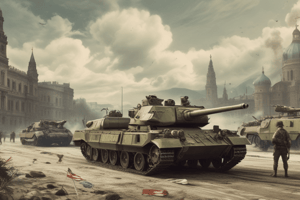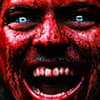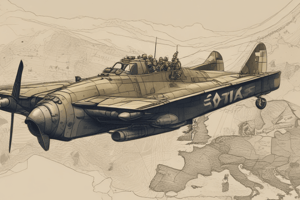Podcast
Questions and Answers
Quale evento è considerato l'immediato innesco della prima guerra mondiale?
Quale evento è considerato l'immediato innesco della prima guerra mondiale?
- L'assassinio di Archiduca Franz Ferdinand (correct)
- La firma del trattato di Versailles
- La Dichiarazione di guerra della Germania contro la Francia
- La battaglia di Stalingrado
Chi è stato uno dei leader alleati più importanti durante la seconda guerra mondiale?
Chi è stato uno dei leader alleati più importanti durante la seconda guerra mondiale?
- Joseph Goebbels
- Benito Mussolini
- Winston Churchill (correct)
- Adolf Hitler
Quale dei seguenti è un esempio di militarismo?
Quale dei seguenti è un esempio di militarismo?
- La costruzione di fortezze lungo le frontiere
- L'aumento delle spese per la difesa (correct)
- La corsa alle colonie africane
- La formazione di alleanze internazionali
Qual è stato il risultato della richiesta di resa incondizionata della Germania?
Qual è stato il risultato della richiesta di resa incondizionata della Germania?
Quale battaglia è considerata un punto di svolta sulla fronte orientale?
Quale battaglia è considerata un punto di svolta sulla fronte orientale?
Quale alleanza includeva Francia, Gran Bretagna e Russia?
Quale alleanza includeva Francia, Gran Bretagna e Russia?
Chi fra i leader dell'Asse era anche il leader del Partito Nazista?
Chi fra i leader dell'Asse era anche il leader del Partito Nazista?
Quale leader alleato giocò un ruolo cruciale nella vittoria degli Alleati?
Quale leader alleato giocò un ruolo cruciale nella vittoria degli Alleati?
Quale potenza dell'Asse si oppose all'aggressione giapponese in Cina?
Quale potenza dell'Asse si oppose all'aggressione giapponese in Cina?
Quale leader alleato era noto per i suoi discorsi famosi, tra cui l'indirizzo 'We shall fight on the beaches'?
Quale leader alleato era noto per i suoi discorsi famosi, tra cui l'indirizzo 'We shall fight on the beaches'?
Quale evento scatenò la seconda guerra mondiale?
Quale evento scatenò la seconda guerra mondiale?
Flashcards are hidden until you start studying
Study Notes
Causes of WW1
- Assassination of Archduke Franz Ferdinand: The immediate trigger for the war, leading to a chain reaction of alliances and military mobilizations.
- Nationalism: Rising tensions between European powers, fueled by nationalist sentiments and competition for colonies and resources.
- Imperialism: European powers' scramble for colonies and territories, leading to conflicts over territories and resources.
- Militarism: The buildup of military forces and the glorification of war, creating an atmosphere in which war was seen as a viable solution to conflicts.
- Alliances: Complex system of alliances between European powers, including the Triple Entente (France, Britain, Russia) and the Triple Alliance (Germany, Austria-Hungary, Italy).
Allied Victory
- Turning Points:
- Battle of Stalingrad (1942-1943): Soviet Union's decisive victory over Germany, marking a turning point on the Eastern Front.
- D-Day Invasion of Normandy (1944): Allied forces' successful landing in France, opening up a second front against Germany.
- Soviet Advance on Berlin (1945): Soviet forces' capture of Berlin, leading to Germany's surrender.
- Key Allied Leaders:
- Winston Churchill (UK)
- Franklin D. Roosevelt (USA)
- Joseph Stalin (USSR)
- Unconditional Surrender: Allied demand for Germany's unconditional surrender, leading to the country's capitulation in May 1945.
Axis Powers
- The Axis Alliance: Germany, Italy, and Japan formed the Axis powers, united in their opposition to the Allied powers.
- Key Axis Leaders:
- Adolf Hitler (Germany)
- Benito Mussolini (Italy)
- Hirohito (Japan)
- Aggressive Expansion: The Axis powers' aggressive expansionist policies, including Germany's invasion of Poland, Italy's invasion of Ethiopia, and Japan's invasion of China.
Leaders
- Winston Churchill: British Prime Minister, known for his leadership during WWII and his famous speeches, including the "We shall fight on the beaches" address.
- Adolf Hitler: German Chancellor, leader of the Nazi Party, and architect of the Holocaust.
- Benito Mussolini: Italian dictator, leader of the Fascist Party, and ally of Nazi Germany.
- Joseph Stalin: Soviet leader, who played a crucial role in the Allied victory, but was also responsible for millions of deaths during his reign.
Studying That Suits You
Use AI to generate personalized quizzes and flashcards to suit your learning preferences.





